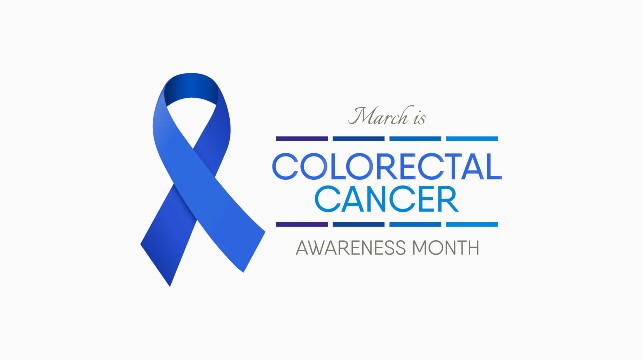Colorectal Cancer Awareness Month

“Colorectal cancer awareness month is observed in March to highlight the importance of screening for colorectal cancer (CRC), as well as to promote healthy lifestyle habits that can decrease a person’s risk of developing cancer of the colon or rectum…” (www.cancer.org) Basic information is needed to understand what occurs in colorectal cancer. First, the colon, or large intestine, is 5-6 feet long. The last 5-10 inches of the colon make up the rectum. Second, colorectal cancer occurs when abnormal cells form tumors in the inner lining of the normal tissues of the gastrointestinal system. “The exact type of colon or rectal cancer depends on where the abnormal cells first begin, how fast they grew, and if they spread.” (www.fightcolorectalcancer.org) Colon cancer and rectal cancer are often grouped together because they have so many features in common.
There are some risk factors for getting colorectal cancer that can’t be controlled. It affects both men and women, as well as people of all ages, races, and ethnicities. About 90% of people with this diagnosis are over age 50 years. As one ages, more polyps grow in the colon and there are gene changes that make normal tissue turn into cancerous tissue. Therefore risk increases with one’s age. Other common risk factors for CRC include:
- Consuming few fruits and vegetable and little fiber in one’s diet
- Being overweight or obese
- Partaking in little physical activity or exercise
- Smoking
- Eating a diet high in red meat, processed meat, and fat
- Preparing meats by frying, grilling, or broiling at high temperatures
- Consuming large amounts of alcohol
Other increased risks for CRC include family history of the disease, family history of polyps, personal history of colon polyps, a personal diagnosis of type 2 diabetes, and previous radiation therapy on the abdomen.
In the early stages of colorectal cancer, one might not exhibit any signs or symptoms so screening is important. A tumor starts small and no side effects are noted, but as it grows, the tumor can make it difficult for the body to digest food and remove waste, and can cause severe abdominal and bowel problems. As the disease progresses, the following signs or symptoms might be noted.
- Rectal bleeding or blood in stool (bowel movement, poop)
- Ongoing changes in bowel habits
- Stools that are narrower than usual
- Frequent gas pains, bloating, a feeling of fullness, or abdominal cramps
- Weight loss for no reason
- Weakness and fatigue (feeling very tired)
Now colorectal cancer is the second leading cause of death in men and women combined, in the United States. It is highly preventable with screening or is treatable when caught early. Affordable take-home options exist as do more invasive tests such as colonoscopy. The problem is that there are more than 20 million Americans who are eligible for CRC screening, but who haven’t been screened. By 2030, it is expected that of all cancers, colorectal cancer will take the most lives of people under the age of 50 years. Because of these new sobering statistics, it is recommended that starting at age 45 years, everyone needs to get screened for colorectal cancer, regardless of symptoms. “Fight colorectal cancer” is working to raise awareness of the importance of colorectal screening.
